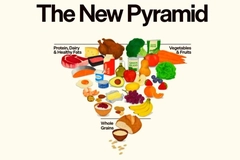More consumer alignment is needed for future health ingredients success, Nutrition Manager at Kerry warns
“Combining healthy halos and science”: KHNI eyes opportunities in cognitive and proactive health
.jpg)
23 Apr 2019 --- Amid the trend towards mindful consumption, proactive health and functional foods are thriving – which can be seen across the board. However, according to Dr. Michael Kemp, Nutrition Manager at Kerry Taste & Nutrition, the industry is “fooling itself by thinking that it can build something successful, without listening to what the consumer actually wants.” Weight loss, stress reduction, sleep aids and mood reduction are among the areas that consumers are most interested in, but where there is a shortage in nutritional options available.
According to Kerry Health & Nutrition Institute (KHNI), there can often be a disconnect between what consumers perceive as healthy in a food or beverage, what science shows is healthy and what claims can be made. “More alignment for ingredients in that direction is needed and are important to the future success of the industry. In particular, it’s going to be very important for the newer generations and consumers that are demanding these healthy ingredients,” Dr. Kemp explains during a webinar Q&A last week.
This raises questions over how to deliver on-trend foods with a strong health halo while ensuring consumers get the health benefit they expect from a product.
 Dr. Michael Kemp, Nutrition Manager at Kerry Taste & NutritionDr. Kemp believes that if the industry were to survey the most “remedy-generating ingredients for functional benefits,” they would mostly be focused on weight loss, protein and probiotics. “However, if you asked the consumer about what they are most interested in, you can expect weight loss, stress reduction, sleep aids and mood reduction to be common responses,” he says. “And there aren’t many companies out there who provide these benefits.”
Dr. Michael Kemp, Nutrition Manager at Kerry Taste & NutritionDr. Kemp believes that if the industry were to survey the most “remedy-generating ingredients for functional benefits,” they would mostly be focused on weight loss, protein and probiotics. “However, if you asked the consumer about what they are most interested in, you can expect weight loss, stress reduction, sleep aids and mood reduction to be common responses,” he says. “And there aren’t many companies out there who provide these benefits.”
In the space of experiential nutrients, there are not a lot of product offerings, according to Dr. Kemp, but consumers do want them and they are in high demand. “The secondary benefit of them is that you can take them and then feel an instant benefit, which reduces your need for a clinical study,” he continues. “The consumer is going to put it in their mouth and if they don’t feel the benefit they aren’t going to try it again, it's that simple. Within the experiential nutrition category, this is probably the biggest hole that the industry has which hasn’t been filled in general,” he points out.
One of Innova Market Insights key trends for 2019 is “I Feel Good.” There is a rising interest in the role that nutrition can play in day-to-day life and it is not only about physical, but also emotional wellbeing, whether in terms of mood, comfort or a clear mind.
An Innova Market Insights Consumer Lifestyle and Attitudes Survey (2018) found that eight in ten consumers agreed that mental health is as important as physical health to overall wellbeing, rising to nine out of ten respondents in China, the US and Brazil. Food and beverage brands are tapping into this need with “feel good” language, brain health claims and “guilt-free” messaging. Brands are also reaching out to the “mindful consumer” with foods and beverages that satisfy the soul, as well as tackling appetite.
According to Dr. Kemp, ingredients and health claims that consumers believe the most are often provided to them by their peers or family members. “Social factors influence opinions a great deal, so consumers will follow friends and family first and foremost, before believing any claims they read on packaging,” he explains.
This raises an interesting marketing and R&D challenge for the industry. “Those consumers are going to follow their peers, you need to make sure that you are protecting yourself by anchoring what the health halo is, by the science-backed claims,” Dr. Kemp notes. “You may not know what you are claiming against is a science-backed ingredient, but you need that in there for your own protection.”
In the space of health ingredients, the consumer is seeking out nutritionals that support brain health, metabolic health and energy.
Looking back at this from a health-boosting perspective, it is clear that launches with a brain health claim are trending. Product launches with this type of claim trebled from 2014 to 2018, when taking 2014 as a base of 100. A consumer survey conducted in the US in 2018 by Innova Market Insights found that eight in 10 US and UK consumers say that the sharpness of their brain is very important to them (2018). So, claims in NPD such as “increase concentration” and “boost memory and intelligence” are becoming more prominent.
Innova Market Insights has reported 21 percent average annual growth in food and beverage launches tracked with a feel good claim (Global, CAGR 2014-2018). Launches such as Happy Inside from Kellogg’s demonstrates this. There is also a renewed interest in active ingredients that can benefit the mood, such as omega 3, GABA and gingko biloba.
One untapped ingredient with true potential is apple cider vinegar (ACV), according to Dr. Lisa Ryan, Head of the Department of Natural Sciences, GMIT in Ireland. Also speaking during the webinar last week, Dr. Ryan noted that although there is very little research on ACV, there is also a long historical use of it in many cultures and communities.  Dr. Lisa Ryan, Head of the Department of Natural Sciences, GMIT in Ireland
Dr. Lisa Ryan, Head of the Department of Natural Sciences, GMIT in Ireland
“There is a perception that people who consume ACV regularly have lower BMI’s, and seem to not struggle with their weight as much as perhaps someone who has never consumed ACV. Although there is some scientific basis around this, it does seem as though people have jumped ahead, and now there is an automatic assumption that ACV aids weight issues,” she explains. “It is possible, and may well be substantiated, but from a scientific point of view, there isn’t a substantiation with ACV. However, that isn’t to say that there will not ever be one in the future.”
It could be something for the ingredients industry to assess more independently, says Dr. Ryan. “And if it could be isolated, perhaps it could then be added to different products, for example, so there are potentially some untapped opportunities here.”
Furthermore, there is also a strong interest in digestive health products, with one in four US consumers indicating that digestive health is an almost daily problem for them, for example. This notion has gained a lot of attention in the mainstream media recently.
Digestive health NPD is, therefore, thriving globally. The digestive health claim encompasses digestive health positionings plus high in/source of fiber, prebiotics and probiotics claims. Despite the strict regulatory environment in Europe, when it comes to health claims, over 7 percent of launches reported in Europe in 2018 featured a claim, which was typically a high in fiber one. Australasia was the clear leader in this space with over 13 percent of launches featuring one of these claims. North America was also strong at 8 percent, but this was down somewhat from 2016. Asian markets were relatively stable for digestive health claims at over 6 percent, according to data from Innova Market Insights.
You can listen to the full webinar here.
By Elizabeth Green












